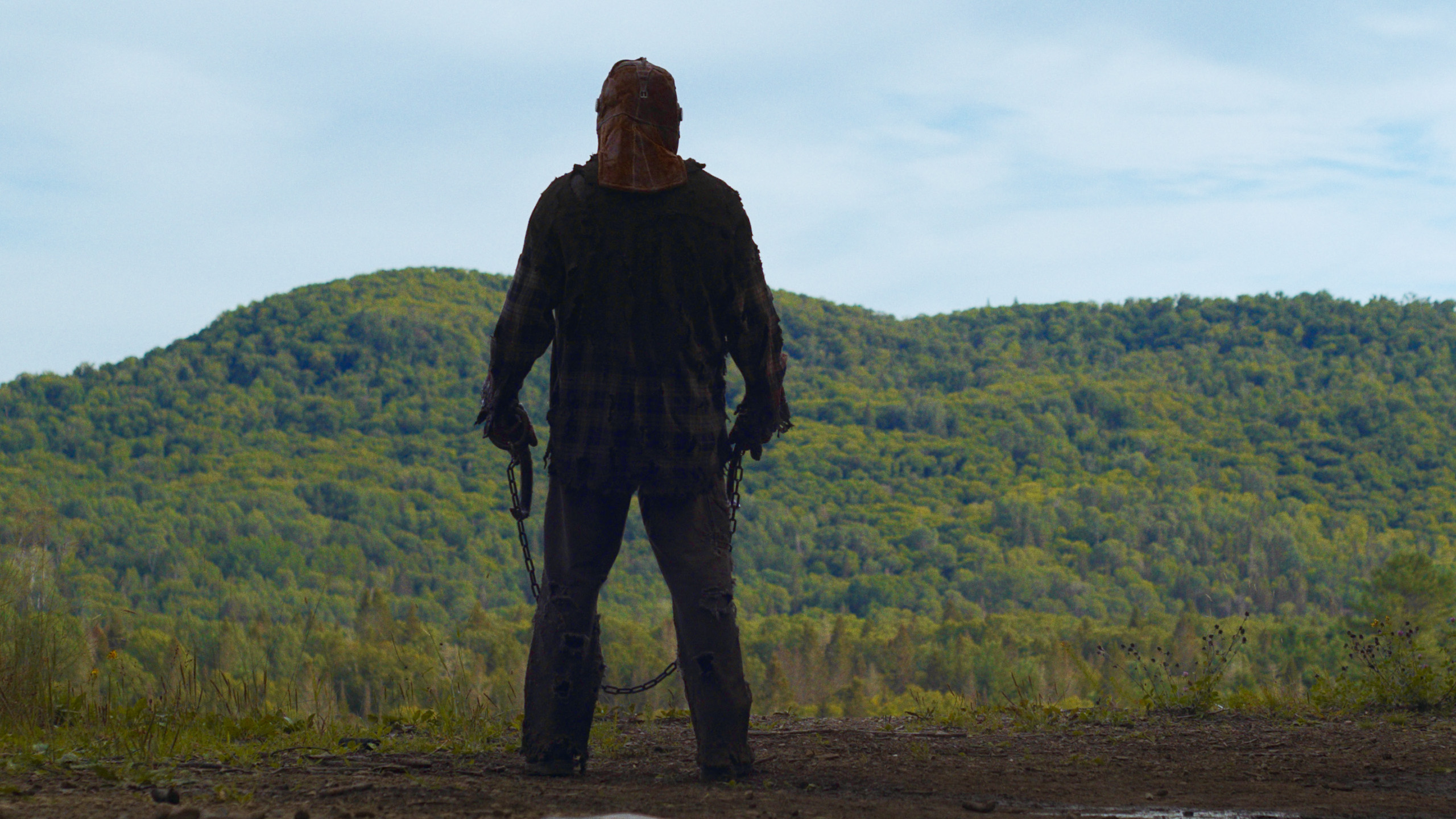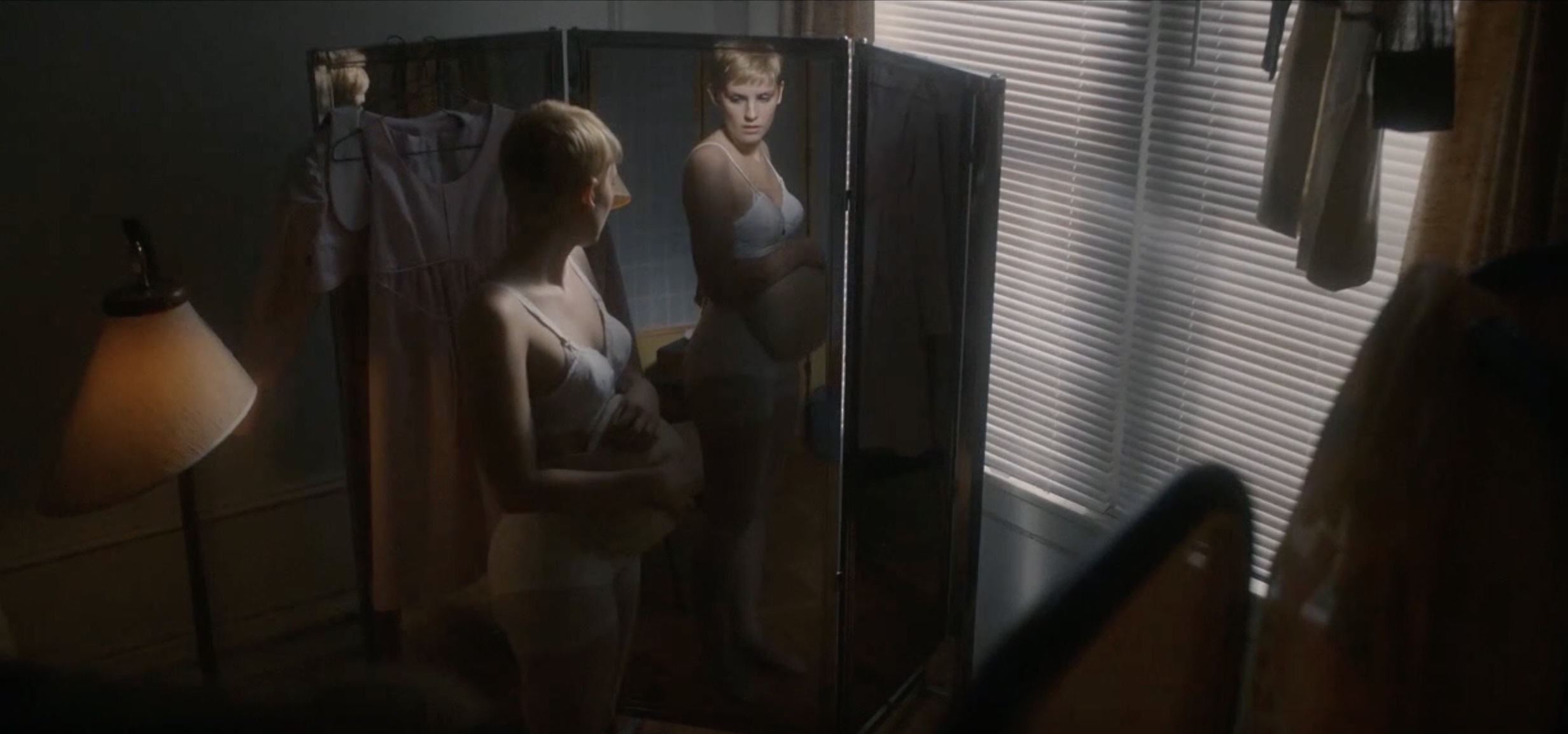Reviews
‘In a Violent Nature’ Sundance Review – Arthouse Slasher Frames Gory Carnage From Killer’s Perspective

Writer/Director Chris Nash’s feature debut, In a Violent Nature, upends a straightforward Friday the 13th-inspired slasher concept by reframing the events almost entirely from the perspective of the undead killer. That’s not the only massive shift that sets Nash’s slasher apart from conventional fare. In a Violent Nature may offer slasher thrills and a delightfully gory rampage across the wilderness, but Nash’s approach captures the carnage through ambient realism. It results in a fascinating arthouse horror experiment that plays more like a minimalist slice-of-life feature with a grim twist.
The opening frame signals a vastly different type of slasher as unseen voices recount the local legend of the White Pines slaughter as the camera fixates on the remnants of a dilapidated fire tower. Once those voices retreat back to their friend group for a weekend of fun in the woods, undead Johnny (Ry Barrett) awakens and rises from the damp soil. The camera then shifts to observe Johnny’s methodical quest to punish those who unwittingly summoned him, watching from a safe distance behind or over his shoulder. Johnny bides his time, demonstrating unaffable and unwavering patience like his Jason Voorhees counterpart, as he embarks on a new wave of slaughter.
Nash’s feature debut fills in the blanks of the killer’s whereabouts when not on the immediate attack. That leads to long stretches of Johnny lumbering through pristine woods, with cinematographer Pierce Derks capturing the inherent beauty of the forest through wide shots enhanced by diegetic, ambient sound. The matter-of-fact approach that favors realism and emphasis on nature draws easy comparisons to minimalist filmmakers like Gus Van Sant or Kelly Reichardt. This methodical tromping through the woods gets punctuated by bursts of slasher familiarity as Johnny occasionally comes across new weaponry and victims to rip apart.
In lesser hands, the disparate tone toggling between conventional slasher and arthouse experiment would clash to an off-putting degree. But Nash makes smart choices to ensure these warring tones somehow mesh into a cohesive effort. That’s largely thanks to the distance created not just between the silent supernatural killer and his victims, whose dialogue is often muted compared to the loud diegetic sounds, but also between the killer and the audience. Johnny’s backstory gets relayed piecemeal, signaling a far more energetic slasher happening offscreen, rendering the slasher villain a fascinating curiosity. It’s those distant, quiet stretches that often intrigue most, with Nash raising questions for his audience to sit with, like how much humanity possibly remains within this hulking undead mass.
Nash further demonstrates a keen reverence for slashers, beyond its orderly deconstruction of the formula, by not withholding at all when it comes to the kills. The arthouse sensibilities get paused throughout by a firm commitment to a true slasher staple: inventive and gnarly as hell kills. Of course, that doesn’t come as much of a surprise, considering Nash hails from a special effects background, having previously worked as the on-set creature effects supervisor on Psycho Goreman. Nash also enlisted Psycho Goreman writer/director and SFX wizard Steven Kostanski for the film’s prosthetic effects. All of this to say that, while Johnny may play it simple upon first emerging from his grave, the killer gets downright ruthless in finding the most imaginative and deranged ways to destroy a human body. In a Violent Nature features at least one extremely gory, wild death that’s sure to get horror fans talking for a while to come.
For all that In a Violent Nature does well, it eventually fizzles out with a focus Johnny’s final girl, Kris (Andrea Pavlovic). While the unhurried, minimalist approach works well for an undead killer who has no concept of urgency, it fails when applying that same philosophical meditation to Kris and her newfound brush with trauma. Instead of some definitive conclusion, In a Violent Nature just slowly drifts into subdued tedium.
Nash’s debut offers a stylized high-concept slasher whose arthouse leanings are sure to polarize. The stripped-down approach fascinates, and the commitment to practical gore is commendable, even if it doesn’t reinvent the wheel.
In a Violent Nature made its World Premiere at the Sundance Film Festival. The release date for the Shudder slasher is TBA.


Reviews
“AHS: Delicate” Review – “Little Gold Man” Mixes Oscar Fever & Baby Fever into the Perfect Product

‘AHS: Delicate’ enters early labor with a fun, frenzied episode that finds the perfect tone and goes for broke as its water breaks.
“I’ll figure it out. Women always do.”
American Horror Story is no stranger to remixing real-life history with ludicrous, heightened Murphy-isms, whether it’s AHS: 1984’s incorporation of Richard Ramirez, AHS: Cult’s use of Valerie Solanas, or AHS: Coven’s prominent role for the Axeman of New Orleans. Accordingly, it’s very much par for the course for AHS: Delicate to riff on other pop culture touchstones and infinitely warp them to its wicked whims. That being said, it takes real guts to do a postmodern feminist version of Rosemary’s Baby and then actually put Mia Farrow – while she’s filming Rosemary’s Baby, no less – into the narrative. This is the type of gonzo bullshit that I want out of American Horror Story! Sharon Tate even shows up for a minute because why the hell not? Make no mistake, this is completely absurd, but the right kind of campy absurdity that’s consistently been in American Horror Story’s wheelhouse since its inception. It’s a wild introduction that sets up an Oscar-centric AHS: Delicate episode for success. “Little Gold Man” is a chaotic episode that’s worth its weight in gold and starts to bring this contentious season home.
It’d be one thing if “Little Gold Man” just featured a brief detour to 1967 so that this season of pregnancy horror could cross off Rosemary’s Baby from its checklist. AHS: Delicate gets more ambitious with its revisionist history and goes so far as to say that Mia Farrow and Anna Victoria Alcott are similarly plagued. “Little Gold Man” intentionally gives Frank Sinatra dialogue that’s basically verbatim from Dex Harding Sr., which indicates that this demonic curse has been ruffling Hollywood’s feathers for the better part of a century. Anna Victoria Alcott’s Oscar-nominated feature film, The Auteur, is evidently no different than Rosemary’s Baby. It’s merely Satanic forces’ latest attempt to cultivate the “perfect product.” “Little Gold Man” even implies that the only reason that Mia Farrow didn’t go on to make waves at the 1969 Academy Awards and ends up with her twisted lot in life is because she couldn’t properly commit to Siobhan’s scheme, unlike Anna.
This is easily one of American Horror Story’s more ridiculous cold opens, but there’s a lot of love for the horror genre and Hollywood that pumps through its veins. If Hollywood needs to be a part of AHS: Delicate’s story then this is actually the perfect connective tissue. On that note, Claire DeJean plays Sharon Tate in “Little Gold Man” and does fine work with the brief scene. However, it would have been a nice, subtle nod of continuity if AHS: Delicate brought back Rachel Roberts who previously portrayed Tate in AHS: Cult. “Little Gold Man” still makes its point and to echo a famous line from Jennifer Lynch’s father’s television masterpiece: “It is happening again.”
“Little Gold Man” is rich in sequences where Anna just rides the waves of success and enjoys her blossoming fame. She feels empowered and begins to finally take control of her life, rather than let it push her around and get under her skin like a gestating fetus. Anna’s success coincides with a colossal exposition dump from Tavi Gevinson’s Cora, a character who’s been absent for so long that we were all seemingly meant to forget that she was ever someone who was supposed to be significant. Cora has apparently been the one pulling many of Anna’s strings all along as she goes Single White Female, rather than Anna having a case of Repulsion. It’s an explanation that oddly works and feeds into the episode’s more general message of dreams becoming nightmares. Cora continuing to stay aligned with Dr. Hill because she has student loans is also somehow, tragically the perfect explanation for her abhorrent behavior. It’s not the most outlandish series of events in an episode that also briefly gives Anna alligator legs and makes Emma Roberts and Kim Kardashian kiss.

“Little Gold Man” often feels like it hits the fast-forward button as it delivers more answers, much in the same vein as last week’s “Ava Hestia.” These episodes are two sides of the same coin and it’s surely no coincidence that they’re both directed by Jennifer Lynch. This season has benefitted from being entirely written by Halley Feiffer – a first for the series – but it’s unfortunate that Lynch couldn’t direct every episode of AHS: Delicate instead of just four out of nine entries. That’s not to say that a version of this season that was unilaterally directed by Lynch would have been without its issues. However, it’s likely that there’d be a better sense of synergy across the season with fewer redundancies. She’s responsible for the best episodes of AHS: Delicate and it’s a disappointment that she won’t be the one who closes the season out in next week’s finale.
To this point, “Little Gold Man” utilizes immaculate pacing that helps this episode breeze by. Anna’s Oscar nomination and the awards ceremony are in the same episode, whereas it feels like “Part 1” of the season would have spaced these events out over four or five episodes. This frenzied tempo works in “Little Gold Man’s” favor as AHS: Delicate speed-runs to its finish instead of getting lost in laborious plotting and unnecessary storytelling. This is how the entire season should have been. Although it’s also worth pointing out that this is by far the shortest episode of American Horror Story to date at only 34 minutes. It’s a shame that the season’s strongest entries have also been the ones with the least amount of content. There could have been a whole other act to “Little Gold Man,” or at the least, a substantially longer cold open that got more out of its Mia Farrow mayhem.
“Little Gold Man” is an American Horror Story episode that does everything right, but is still forced to contend with three-quarters of a subpar season. “Part 2” of AHS: Delicate actually helps the season’s first five episodes shine brighter in retrospect and this will definitely be a season that benefits from one long binge that doesn’t have a six-month break in the middle. Unfortunately, anyone who’s already watched it once will likely not feel compelled to experience these labor pains a second time over. With one episode to go and Anna’s potential demon offspring ready to greet the world, AHS: Delicate is poised to deliver one hell of a finale.
Although, to paraphrase Frank Sinatra, “How do you expect to be a good conclusion if this is what you’re chasing?”















You must be logged in to post a comment.